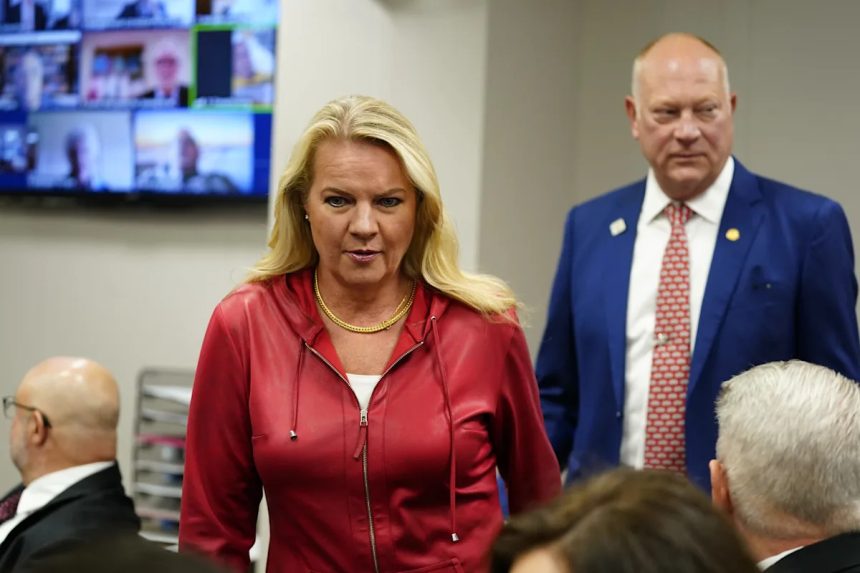LANSING — A group of Michigan Republicans will not face criminal trial over a series of felony charges stemming from an alleged attempt to steer the 2020 election to President Donald Trump, after a judge dismissed the state’s case against them.
Ingham County District Judge Kristen Simmons’ Sept. 9 ruling is a blow to Michigan Attorney General Dana Nessel, who charged 16 with a series of election- and forgery-related charges in 2023. Nessel’s office oversaw the prosecution, which ends after Simmons determined there was not enough probable cause to send the case to trial after a lengthy preliminary examination process.
Defendant Meshawn Maddock walks into the courtroom of Judge Kristen Simmons with her husband, Matt Maddock, in Lansing’s 54A District Court on Tuesday, Sept. 9, 2025.
Simmons, reciting her ruling during the hearing, criticized prosecutors for insufficiently establishing a case against the so-called fake electors, and said it was more likely any intent to defraud was on the behalf of the Trump campaign.
“This is a fraud case, and we have to prove intent. And I don’t believe there is evidence sufficient to prove intent,” Simmons said.
The charges brought by Nessel’s office stemmed from an attempt by 16 Republicans on Dec. 14, 2020, to enter the Michigan Capitol and cast the state’s electoral votes to Trump, despite his loss to former President Joe Biden in Michigan that year. At the time, Democratic electors had met in the Capitol to cast votes for Biden, completing a routine process that typically happens with little fanfare.
Michigan State Police denied the group of Republicans entry to the building, although court testimony offered during the case indicated the group signed documents purporting a Trump win in Michigan. Those documents were transmitted to the National Archives, although the state’s 16 electoral votes were cast for Biden. Trump, of course, won reelection to the White House in 2024.
Prosecutors, during preliminary examination hearings, pointed to the documents as evidence the group tried to defraud Michigan voters. But defense attorneys countered, saying the documents were signed at the instruction of Trump campaign lawyers. Unlike in other states where slates of fake electors were criminally charged, no charges were brought against Trump campaign officials in Michigan.
Defense attorneys also argued at the time the group signed the documents purporting a Trump win in Michigan, there remained uncertainty over the outcome of the 2020 election. Despite claims by Trump and his allies to the contrary, there is no evidence of widespread voter fraud taking place in Michigan or any other state that year, according to numerous lawsuits and election audits.

Protesters in favor of the fake electors pose for a photo outside of the David C. Hollister City Hall in Lansing on Tuesday, Sept. 9, 2025.
But Simmons said testimony offered in the case made it clear — the electors were instructed by the Trump campaign that they were acting in the event results were overturned for Trump. Simmons said the charges require an element of intent. She recalled the witness testimony of James Renner, a Republican fake elector who was initially charged then had his case dismissed after agreeing to testify.
Renner testified he didn’t think he was doing anything wrong when he signed the documents. Simmons, who described Renner as the government’s “chief witness,” said his testimony indicated a lack of intent.
“He was led to believe that their actions were part of some legitimate political (action),” Simmons said. She said it was more likely the Trump campaign attorneys withheld information from the electors, but noted no charges had been brought against the campaign.
“This case hinges on the element of intent of these actors,” she said. “This is not the intent of (Shawn) Flynn, the intent of (Kenneth) Chesebro, (Rudy) Giuliani or Donald Trump.” Flynn, Chesebro and Giuliani are all former attorneys of the Trump campaign.
Before the hearing began, a group of demonstrators gathered outside Lansing City Hall, holding signs decrying the charges. Ron Riesterer, of Van Buren County, said he wanted to support those charged, who he described as personal friends who were only trying to perform their civic duty.
“I would hope the attorney general’s office and any attorney across the state of Michigan would be focused on enforcing the law and going after actual criminals, not to make up laws and pretend charges, and spend tens of thousands if not hundreds of thousands of dollars, chasing something that is absolutely not helping the citizenry of Michigan,” Riesterer, 73, said before the hearing.
This story will be updated.
Contact Arpan Lobo: alobo@freepress.com
This article originally appeared on Detroit Free Press: Judge dismisses case against ‘fake electors’ in Michigan









